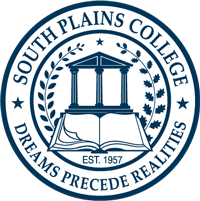FH. Equal Opportunity, Harassment, and Nondiscrimination (Sexual and Gender-Based Misconduct) (BOD approved- 3/21/2024)
Due to the length of the policy, please click here for the full PDF format.
In compliance with the State of Texas Education Code Section 1, Section 51.9363, this policy is required to be reviewed by South Plains College each biennium, and with approval of the Board of Regents, revise the policy as necessary.
As used in this document, the term “Complainant” refers to the person impacted by alleged discrimination. The term “Respondant” refers to the person who has allegedly engaged in discrimination.
Applicable Scope
South Plains College affirms its commitment to promote the goals of fairness and equity in all aspects of the educational enterprise. All policies below are subject to resolution using the College’s Equity Resolution Process (ERP) as detailed in the full policy. When the Respondant is a member of the College community, the ERP is applicable regardless of the status of the Respondant who may be a member or non-member of the campus community, including students, student organizations, faculty, administrators, staff, guests, visitors, campers, etc.
Title IX Coordinator
The Vice President for Student Affairs serves as the Title IX Coordinator and ADA/504 Coordinator and oversees implementation of the College’s Affirmative Action and Equal Opportunity plan, disability compliance and the College’s policy on equal opportunity, harassment and nondiscrimination. The Title IX Coordinator heads the Title IX Team and acts with independence and authority free of conflicts of interest. To raise any concern involving a conflict of interest by the Title IX Coordinator, contact the College President at (806) 716-2201. To raise concerns regarding a potential conflict of interest with any other administrator involved in the ERP, please contact the Title IX Coordinator.
Inquiries about and reports regarding this policy and procedure may be made internally to:
Stan DeMerritt, Ph.D.
Title IX Coordinator
Office of the Vice President for Student Affairs
1401 S. College Avenue
Student Services Building
Levelland, TX 79336
(806) 716-2360 [email protected]
Complaints and Incident Reporting Link
Deputy Title IX Coordinators:
Ms. Jeri Ann Dewbre
Director of Human Resources
(806) 716-2111
[email protected]
Dr. Kara Martinez
Dean of the Lubbock Downtown Center
(806) 716-4700
[email protected]
Dr. Ben Alexander
Executive Director of the Lubbock Career and Technical Center
(806) 716-4608
[email protected]
Director of the Plainview Center
(806) 716-2301
[email protected]
Dr. Jacob Braddock
Director of the Reese Center
(806) 716-4877
[email protected]
Inquiries may be made externally to:
Office for Civil Rights (OCR) – Dallas, Texas Office
1999 Bryan Street, Suite 1620
Dallas, TX 75201-6810
Customer Service Hotline: (800) 421-3481
Telephone: (214) 661-9600
Facsimile: (214) 661-9587
TDD: (800) 877-8339
Email: [email protected]
Web: http://www.ed.gov/ocr
How to file a complaint: https://youtu.be/dvxa5dYNKK8
Office for Civil Rights (OCR)
U.S. Department of Education
400 Maryland Avenue, SW
Washington, DC 20202-1100
Customer Service Hotline: (800) 421-3481
Facsimile: (202) 453-6012
TDD: (877) 521-2172
Email: [email protected]
Web: http://www.ed.gov/ocr
How to file a complaint: https://youtu.be/dvxa5dYNKK8
Equal Employment Opportunity Commission (EEOC) – El Paso Area Office
100 Stanton Towers
100 N. Stanton Street, Suite 600
El Paso, TX 79901-1433
Telephone: (800) 669-4000
Facsimile: (915) 534-6701
TTY: (800) 669-6820
ASL Video Phone: (844) 234-5122
Online inquiry/appointment scheduler: https://publicportal.eeoc.gov/portal/
Web: http://www.eeoc.gov
Reporting Discrimination
Reports of discrimination, harassment and/or retaliation may be made using any of the following options. There is no time limitation on the filing of allegations. However, if the responding party is no longer subject to the College’s jurisdiction, the ability to investigate, respond and provide remedies may be more limited:
1) Report directly to the Title IX Coordinator or deputies noted above
2) Report online, using the reporting form posted at https://www.southplainscollege.edu/referrals.php; and/or
3) Report using the sexual harassment hotline (806) 716-2396.
All reports are acted upon promptly while every effort is made by the College to preserve the privacy of reports. Such reports may also be anonymous. Anonymous reports will be investigated to determine if remedies can be provided. Additionally, all employees of the College are designated as mandated reporters and will share a report with the Title IX Coordinator promptly. Confidentiality and mandated reporting is addressed more specifically below. Reports of misconduct or discrimination committed by the Title IX Coordinator should be reported to the College President at (806) 716-2201.
Jurisdiction
This policy applies to behaviors that take place on the campus, at College-sponsored events and may apply off-campus and to actions online, when the Title IX Coordinator determines that the off-campus conduct affects a substantial College interest. A substantial College interest is defined to include:
a) Any action that constitutes a criminal offense as defined by law. This includes, but is not limited to, single or repeat violations of any local, state or federal law;
b) Any situation where it appears that the responding party may present a danger or threat to the health or safety of self or others;
c) Any situation that significantly impinges upon the rights, property or achievements of self or others or significantly breaches the peace and/or causes social disorder; and/or
d) Any situation that is detrimental to the educational interests of the College.
Any online postings or other electronic communication by students, including cyber-bullying, cyber-stalking, cyber-harassment, etc. occurring completely outside of the College’s control (e.g. not on College networks, websites or between College email accounts) will only be subject to this policy when those online behaviors can be shown to cause a substantial on-campus disruption. Otherwise, such communications are considered speech protected by the United State Constitution’s First Amendment. Remedies for such conduct will be provided, but protected speech cannot be legally subjected to discipline.
Off-campus discriminatory or harassing speech by employees may be regulated by the College only when such speech is made in an employee’s official or work-related capacity.

